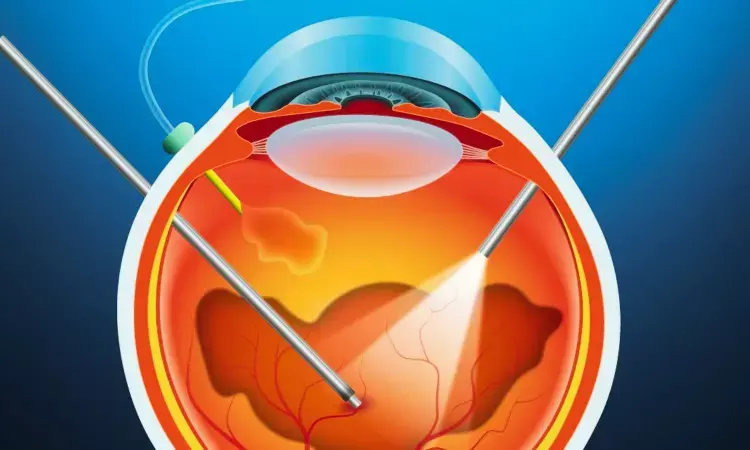- Home
- Medical news & Guidelines
- Anesthesiology
- Cardiology and CTVS
- Critical Care
- Dentistry
- Dermatology
- Diabetes and Endocrinology
- ENT
- Gastroenterology
- Medicine
- Nephrology
- Neurology
- Obstretics-Gynaecology
- Oncology
- Ophthalmology
- Orthopaedics
- Pediatrics-Neonatology
- Psychiatry
- Pulmonology
- Radiology
- Surgery
- Urology
- Laboratory Medicine
- Diet
- Nursing
- Paramedical
- Physiotherapy
- Health news
- Fact Check
- Bone Health Fact Check
- Brain Health Fact Check
- Cancer Related Fact Check
- Child Care Fact Check
- Dental and oral health fact check
- Diabetes and metabolic health fact check
- Diet and Nutrition Fact Check
- Eye and ENT Care Fact Check
- Fitness fact check
- Gut health fact check
- Heart health fact check
- Kidney health fact check
- Medical education fact check
- Men's health fact check
- Respiratory fact check
- Skin and hair care fact check
- Vaccine and Immunization fact check
- Women's health fact check
- AYUSH
- State News
- Andaman and Nicobar Islands
- Andhra Pradesh
- Arunachal Pradesh
- Assam
- Bihar
- Chandigarh
- Chattisgarh
- Dadra and Nagar Haveli
- Daman and Diu
- Delhi
- Goa
- Gujarat
- Haryana
- Himachal Pradesh
- Jammu & Kashmir
- Jharkhand
- Karnataka
- Kerala
- Ladakh
- Lakshadweep
- Madhya Pradesh
- Maharashtra
- Manipur
- Meghalaya
- Mizoram
- Nagaland
- Odisha
- Puducherry
- Punjab
- Rajasthan
- Sikkim
- Tamil Nadu
- Telangana
- Tripura
- Uttar Pradesh
- Uttrakhand
- West Bengal
- Medical Education
- Industry
Early Vitrectomy may Improve Vision and Retinal Health in Open Globe Injuries: Study

Mexico: In the realm of ophthalmic trauma management, a recent systematic review and meta-analysis have compared the outcomes of early versus delayed vitrectomy in cases of open globe injuries (OGIs), shedding light on optimal treatment timelines for improved patient outcomes.
The study, published in Clinical Ophthalmology, showed better postoperative visual acuity, a greater proportion of retinal reattachment, and a decreased incidence of proliferative vitreoretinopathy (PVR) with early vitrectomy (within seven days) compared to delayed surgery (8-14 days).
"Patients who received early intervention showed a 3.42-fold increase in the odds of retinal reattachment and were 2.4 times more likely to achieve visual acuity ≥ 5/200," the researchers reported. "Delayed surgery led to a higher incidence of proliferative vitreoretinopathy and often required multiple vitrectomies."
Open globe injuries, characterized by a full-thickness wound of the eye resulting from trauma, pose significant challenges in ophthalmology due to the potential for severe complications such as retinal detachment and endophthalmitis. Vitrectomy, a surgical procedure involving the removal of vitreous gel from the eye, is often employed to repair these injuries and restore visual function. However, there is a lack of consensus concerning the optimal timing of vitrectomy for maximizing visual outcomes.
To fill this knowledge gap, Miguel A Quiroz-Reyes, Retina Department. Oftalmologia Integral ABC, Affiliated with the Postgraduate Studies Division at the National Autonomous University of Mexico, Mexico City, Mexico, and colleagues aimed to investigate whether early or delayed vitrectomy improves outcomes in patients with OGIs.
For this purpose, the researchers conducted a review based on PRISMA guidelines. They searched the online databases and included clinical studies that used vitrectomy to manage OGIs as early (within seven days) or delayed (8– 14 days) interventions. Randomized controlled trials (RCTs) were evaluated using the Cochrane risk of bias tool, while non-RCTs underwent assessment with the JBI tool.
The researchers reported the following findings:
- Eleven studies met the inclusion criteria and were included in the quantitative analyses. 235 patients with OGIs received early intervention, and 211 received delayed intervention.
- The retina was reattached in 91% and 76% of the patients after early and delayed intervention, respectively.
- Traumatic PVR was present in 9% and 41% of the patients in the early and delayed groups, respectively.
- The odds of retinal reattachment after vitrectomy were greater in the early group (OR = 3.42), and the odds of visual acuity ≥ 5/200 were 2.4 times greater in the early group.
- The incidence of PVR was significantly greater in the delayed surgery group (OR = 0.16), which also required more than one vitrectomy surgery.
In conclusion, the systematic review and meta-analysis comparing early versus delayed vitrectomy for open globe injuries provide compelling evidence supporting the benefits of early surgical intervention. By elucidating optimal treatment timelines, the study underscores the importance of timely vitrectomy in preserving visual function and improving overall patient prognosis in cases of ocular trauma.
"More RCTs are needed to overcome the limitations of this review," the researchers wrote.
Reference:
Quiroz-Reyes MA, Quiroz-Gonzalez EA, Quiroz-Gonzalez MA, Lima-Gómez V. Early versus Delayed Vitrectomy for Open Globe Injuries: A Systematic Review and Meta-Analysis. Clin Ophthalmol. 2024;18:1889-1900. https://doi.org/10.2147/OPTH.S466144
Dr Kamal Kant Kohli-MBBS, DTCD- a chest specialist with more than 30 years of practice and a flair for writing clinical articles, Dr Kamal Kant Kohli joined Medical Dialogues as a Chief Editor of Medical News. Besides writing articles, as an editor, he proofreads and verifies all the medical content published on Medical Dialogues including those coming from journals, studies,medical conferences,guidelines etc. Email: drkohli@medicaldialogues.in. Contact no. 011-43720751


